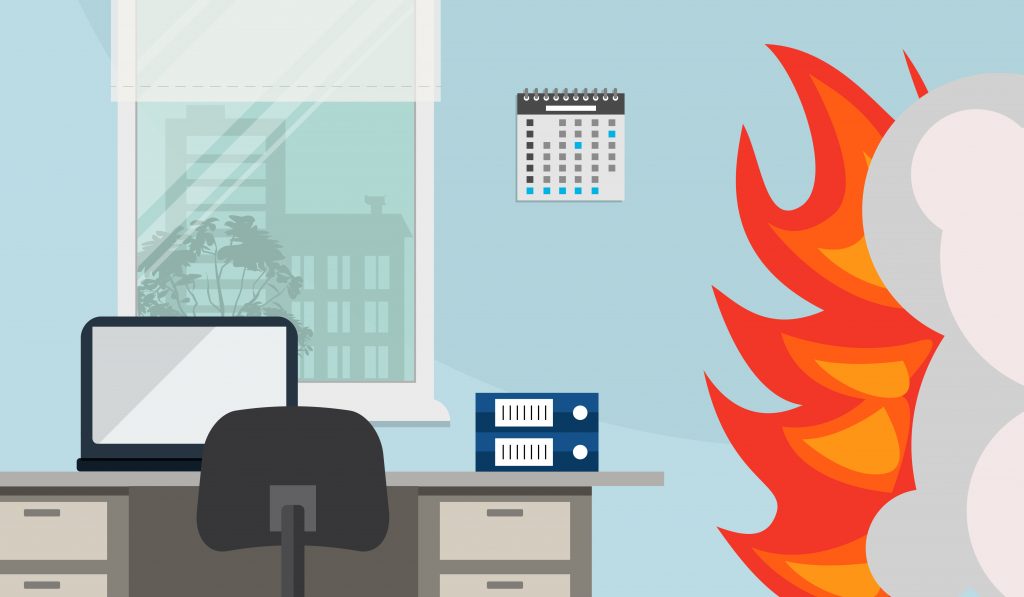How to Stop Common Causes of Fire in The Workplace
We should all be aware of the damage that a fire can do, and if that fire happens in the workplace, it’s not just the future of your business that could be at risk, but also the lives and/or livelihoods of your employees.
We have previously written about some of the common causes of workplace fires, and more recently about the true cost of fire at your business, examining some of the potentially disastrous long-term consequences.
In this article, we’re going to be examining some of the best ways to prevent fires in the workplace from starting in the first place.

Check electrical equipment
Figures suggest that about a quarter of all workplace fires are electrical in nature. Whether it’s down to old and faulty equipment and devices overheating, loose wires, overloaded plug sockets or overcharged lithium-ion batteries, there are many ways that your electrical equipment can be a major risk.
Make sure checking electrical equipment becomes part of your routine – look for any degradation in the condition of cables and plugs, and also accumulations of dust, especially on ventilation areas. You should also encourage staff to report instances of their equipment feeling hotter than usual.
Regular PAT testing, although not a legal requirement in itself (the law merely requires businesses to ensure that electrical equipment is ‘maintained in order to prevent danger’), is very strongly recommended and should be carried out by a competent person.
Staff training
Human error and carelessness are among the most common causes of fire anywhere. At work, that could be spilling liquids over electrical items, accidents in kitchen areas or incorrect usage of equipment.
Staff training – preferably conducted by an accredited organisation, with regular booster sessions, especially if there is an incident or near miss – is not only a good idea, but also part of your responsibilities under the Regulatory Reform (Fire Safety) Order 2005.
Keeping areas tidy
Untidy workplaces don’t just make workplace fires more likely – they also increase the chances of them getting seriously out of hand once they’ve started.
If you’re very busy, it’s easy to put off tidying away or recycling piles of paper and other flammable items accumulated through your regular activities. But the chances of those electrical fires in particular becoming more serious are greatly exacerbated if they can find an easy fuel to feed on.
Your annual fire risk assessment should identify dangerous accumulations of material that could pose a fire risk or block fire exits, but it’s far better to stay on top of it than wait for it to become an issue.
Safe storage
When you tidy away those flammable materials, it’s important that you store them somewhere safe. They should ideally be kept away from electrical equipment and areas where work is carried out that might produce sparks, such as in workshops.
If you have devices powered by lithium-ion batteries, they should be stored in areas out of direct sunlight and where the temperature is between 4°C to 27°C.
Meanwhile, commercial kitchens – where there is likely to be large quantities of highly flammable oils – need to also take particular care about where things are placed and stored, whether they are being used at the time or not.
Fire risk assessment
Your annual fire risk assessment should take all the above factors into account when looking round your business premises. A legal requirement under the Regulatory Reform (Fire Safety) Order 2005, fire risk assessments are one of the most effective means of identifying fire hazards, especially when they are carried out by an experienced fire safety professional.
Of course, that doesn’t mean being aware of fire risks shouldn’t be constantly at the front of your mind. It’s far better to receive a positive report than to be faced with a mountain of issues that need sorting quickly.
Protect your workplace by talking to your local fire safety experts at Scutum London. We can provide professional fire risk assessments and high-quality staff training that can give you and your business the best chance of staying fire safe. We also supply, install and maintain fire detection and fire control solutions such as fire alarms, fire extinguishers, fire doors and much more.
Contact us now for more information or to book a free site visit from one of our experienced advisers.
Request a Callback
Just fill in your details below and we'll get back to you as soon as we can!

About Scutum London
Scutum London is a leading expert in fire safety and security solutions for businesses and organisations located across South East England, including London and Surrey.
From fire alarms, fire extinguishers and fire risk assessments to access control, CCTV and intruder alarm systems – and a lot more besides – we offer a comprehensive range of products and services designed to keep you, your business and your staff and visitors safe.
With decades of industry experience to call on, we’re proud to hold accreditations from leading trade associations and bodies such as British Approvals for Fire Equipment (BAFE), the British Fire Consortium, the Fire Industry Association (FIA) and Security Systems and Alarms Inspection Board (SSAIB).
If you’d like to find out more about Scutum London, get in touch with our friendly team or explore our products and services on our site.

